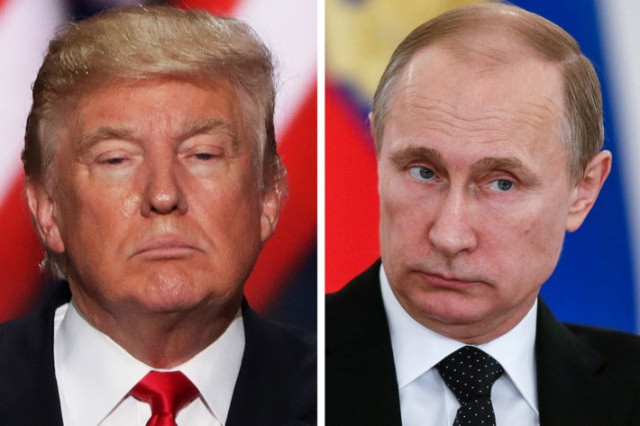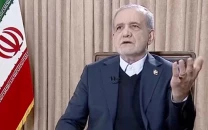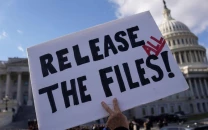Trump 'grudgingly' imposes sanctions against Russia
Signs the bill but criticises it for having "clearly unconstitutional" elements

The legislation will affect a range of Russian industries and might further hurt the Russian economy, already weakened by 2014 sanctions imposed after Russia annexed Crime from Ukraine. PHOTO: AFP
After signing a bill that runs counter to his desire to improve relations with Moscow, and which also affects Iran and North Korea, the Republican president laid out a lengthy list of concerns. "While I favor tough measures to punish and deter aggressive and destabilising behaviour by Iran, North Korea, and Russia, this legislation is significantly flawed," Trump said in a statement announcing the signing.
The Republican-controlled Congress approved the legislation by such a large margin on Thursday that it would have thwarted any effort by Trump to veto the bill. The legislation has already provoked countermeasures by Russian President Vladimir Putin, who has ordered big cuts to the number of staff at the US diplomatic mission to Russia.
Trump, Putin in first showdown at headstrong G20
Congress approved the sanctions to punish the Russian government over interference in the 2016 presidential election, annexation of Ukraine's Crimea and other perceived violations of international norms. Trump said he was concerned about the sanctions' effect on work with European allies, and on American business.
"My administration ... expects the Congress to refrain from using this flawed bill to hinder our important work with European allies to resolve the conflict in Ukraine, and from using it to hinder our efforts to address any unintended consequences it may have for American businesses, our friends, or our allies," he said.
The president also complained about what he said were "clearly unconstitutional provisions" in the legislation relating to presidential powers to shape foreign policy. The new sanctions measure, the first major foreign policy legislation approved by Congress since Trump took office in January, includes a provision allowing Congress to stop any effort by the president to ease existing sanctions on Russia.
Trump has long said he would like improved ties with Russia. But any such efforts by his administration have been hamstrung
by findings by US intelligence agencies that Russia interfered to help the Republican against Democratic presidential candidate Hillary Clinton.
Moscow denies any meddling and Trump denies any collusion by his campaign. In a second statement on the legislation, Trump said that, "Despite its problems, I am signing this bill for the sake of national unity."
Trump urges China to get 'heavy' with North Korea
"It represents the will of the American people to see Russia take steps to improve relations with the United States," he added.
The legislation will affect a range of Russian industries and might further hurt the Russian economy, already weakened by 2014 sanctions imposed after Russia annexed Crime from Ukraine. It also cracks down on Iran and North Korea for activities that include their missile development programs and human rights abuses, including seeking to punish foreign banks that do business with North Korea.
After Congress approved the sanctions, the Kremlin ordered the United States to cut about 60 percent of its diplomatic staff in Russia.
Putin said on Sunday that Russia had ordered the United States to cut 755 of its 1,200 embassy and consulate staff by September, and was seizing two diplomatic properties.
Besides angering Moscow, the legislation has upset the European Union, which has said the new sanctions might affect its energy security and prompt it to act, too.






1721969212-0/BeFunky-collage]-(35)1721969212-0-208x130.webp)












COMMENTS
Comments are moderated and generally will be posted if they are on-topic and not abusive.
For more information, please see our Comments FAQ